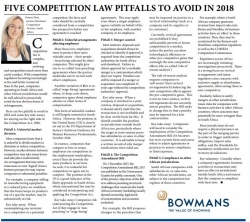Tamara Dini - Five Competition Law Pitfalls To Avoid In 20182018-05-10 Tamara Dini, Partner, Bowmans’ Competition Practice, South Africa
Competition law is complex, and evolving and encapsulates much more than cartel conduct. With competition regulators becoming increasingly active and better resourced than in the past, companies operating in South Africa and other African jurisdictions would be well advised to proactively avoid the less obvious forms of infringements. Here are five pitfalls to avoid in 2018 and some key take-aways for staying on the right side of the Competition Act, 1998. Pitfall 1: Unlawful market division Most companies know that it is unlawful to divide markets to eliminate or reduce competition. However, market division between competitors may take many forms and take place inadvertently. An arrangement that may seem innocuous or even ‘logical’ from a business perspective may expose companies to substantial penalties. For example, a company selling its manufacturing equipment at a reduced price on condition that the buyer keeps its products out of a specific market, may be substantially at risk. Key take-away: When contemplating any restraint on a competitor or a potential competitor, the facts and risks should be carefully considered from a competition law perspective before any agreement is reached. Pitfall 2: Unlawful arrangements affecting employees More than ever, employers want to protect their most valuable assets â€" their people â€" from being solicited by other companies. This might give rise to so-called ‘non-poaching’ agreements where the parties undertake not to recruit each other’s employees. Another variation of this is socalled ‘wage-fixing’ agreements where, to keep costs down, companies agree about employee salaries or other terms of compensation. This form of unlawful conduct is still largely untested in South Africa. However, the position in the United States (US) is clearly set out in the US Department of Justice’s Antitrust Guidance for Human Resources Professionals, October 2016. In essence, companies that compete to hire or retain employees are competitors in the employment marketplace, even if they do provide the same products or services. As such, it is unlawful for competitors to agree not to compete. The position in the US is a good indicator of the likely approach in South Africa where international law may be considered in interpreting and applying the Competition Act. Key take-away: Companies risk contravening the Competition Act if they engage in ‘nonpoaching’ or ‘wage-fixing’ agreements. This may apply even where a single employee agrees verbally on behalf of his or her employer, with another company or its employee. Pitfall 3: Merger control Joint ventures, disposals and acquisitions should always be checked to identify if approval is required from the competition authorities (in South Africa and elsewhere). Failure to obtain approval for a notifiable merger is a contravention which does not ‘expire’. Penalties can still be imposed if a merger or acquisition was completed 15 years ago without the competition authorities’ approval. Key take-away: When a company is involved in a joint venture, disposal or acquisition, it should satisfy itself that the transaction is not notifiable and be clear on the basis for this. It should consider the position in jurisdictions outside South Africa too, particularly where the target or joint venture party has subsidiaries or sales in other countries. It is advisable to keep a written record of why merger notifications were ruled out. Pitfall 4: The Competition Amendment Bill On 1 December 2017, the Competition Amendment Bill, 2017 was published in the Government Gazette for public comment. One of the primary objectives of the Bill is to address persisting structural challenges that constrain the South African economy (including racially skewed ownership, high levels of concentration and economic exclusion). For example, the Bill proposes changes to the penalties that may be imposed on parties in a vertical relationship (such as a company and its supplier or its customer). Currently, vertical agreements are prohibited if they substantially prevent or lessen competition in a market, unless the parties can show technological, efficiency or other pro-competitive gains that outweigh the anti-competitive effects (the so-called ‘rule of reason analysis’). The rule of reason analysis requires companies to ‘self-assess’ their vertical arrangements by balancing the anti-competitive effects against the pro-competitive gains. This is not an exact science, so first infringements do not currently attract penalties. The Bill seeks to change this so that a penalty may be imposed for a first contravention. Key take-away: Companies will need to consider the implications of the Competition Amendment Bill if it becomes law in its current form and assess where to adjust agreements or practices to ensure compliance or limit exposure. Pitfall 5: Compliance in other African jurisdictions South African companies with subsidiaries in, or sales into, other African jurisdictions, are subject to the competition law regimes of those countries. For example, where a South African company generates revenue from import sales into Kenya and Namibia, its business activities have an ‘effect’ in those countries. Thus, they may be scrutinised by the Kenyan and Namibian competition regulators, as well as the COMESA Competition Commission. Regulators across Africa are increasingly initiating investigations proactively. There is a strong focus on vertical arrangements and many regulators raise concerns with exclusive supply or distribution agreements, often seeing these as anti-competitive. Similarly, failure to notify mergers in other jurisdictions raises risks for companies with business activities in other African countries, where sanctions may potentially be more stringent than in South Africa. Most jurisdictions do not require a physical presence on the part of the merging parties in order to trigger notification obligations. Import sales suffice, and the thresholds for mandatory notification are low in many jurisdictions. Key-takeaway: Consider where a company’s agreements, business activities or transactions may have an effect in jurisdictions outside South Africa and ensure that the company is compliant with their laws. |
Tamara Dini - Five Competition Law Pitfalls To Avoid In 2018
Copyright © 2024 KwaZulu-Natal Top Business
